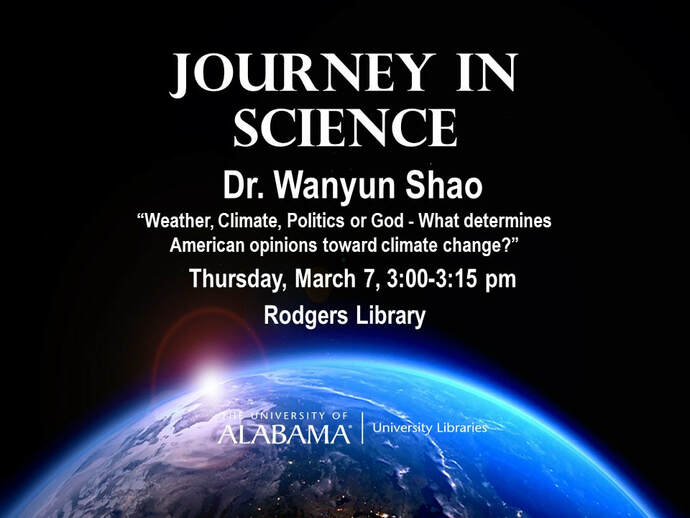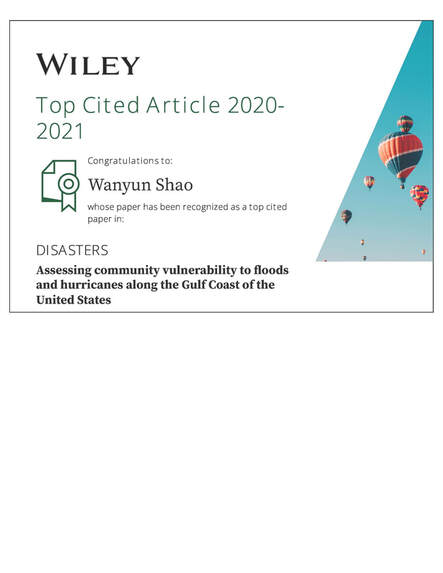|
5/30/2023 0 Comments Our new paper was published in the International Journal of Disaster Risk ReductionOur new paper identifying effective hurricane risk communication tools was published in the International Journal of Disaster Risk Reduction. Below please find the abstract:
"Coastal regions such as the U.S. Atlantic and Gulf Coasts are highly vulnerable to extreme coastal hazards such as tropical cyclones and major hurricanes. The effects of these hazards pose a threat now and are expected to increase in the future, which highlights the need for coastal communities to receive and understand information regarding risks involved with these hazards. Through this study, we identify points of improvement in the tools used to communicate the short and long-term risk associated with hurricane hazards through three surveys in Mobile, AL, Savannah, GA, and Houston TX. These surveys identify public response to hurricane descriptions, Cone of Uncertainty graphics, and long-term trend graphics. Analysis of trends in responses to these communication tools identifies relationships between risk perceptions and existing factors in each study location. Further, public response to these tools is identified and analyzed using structural equation models for each location with a “response” latent variable containing information from endogenous variables in the survey. Response was measured as action intent, concern for the scenario, reported evacuation likelihood, and interpretation of long-term trends. We identify points of improvement for all three communication tools to aid in public comprehension of the information provided as well as to increase response to hurricane hazards by more effectively communicating risk information. These would help to improve comprehension and increase different responses to tropical storm and hurricane damage from high winds and storm surge with the intent to improve resident response to hazards along the U.S. Atlantic and Gulf Coasts."
0 Comments
8/31/2022 2 Comments Our new paper on the socio-geographic patterns of rescue requests during Hurricane Harvey has been published in Findings Our paper on the socio-geographic patterns of rescue requests during Hurricane Harvey has been published in Findings. Below is the abstract:
"We analyze a public dataset of rescue requests for the Houston Metropolitan Area during Hurricane Harvey (2017) from the Red Cross. This dataset contains information including the location, gender, and emergency description in each requester’s report. We reveal the spatial distribution of the rescue requests and its relationship with indicators of the social, physical, and built environment. We show that the rescue request rates are significantly higher in regions with higher percentages of children, male population, population in poverty, or people with limited English, in addition to regions with higher inundation rate or worse traffic condition during Hurricane Harvey. The rescue request rate is found to be statistically uncorrelated with the percentage of flood hazard zone designated by the Federal Emergency Management Agency (FEMA)." 8/2/2022 0 Comments Open PhD Position – coastal community resilience, risk perceptions, community engagement, Nature Based Solution The Environmental Decision Making Lab at the Department of Geography of the University of Alabama seeks a geography PhD student to focus on coastal community resilience, risk perceptions, community engagement under the theme of Nature Based Solution (NBS). The broader research team is focused on developing actionable design guidance for NBS (i.e., wetland restoration) along the US Gulf Coast. Our highly interdisciplinary group includes social scientists, wetland ecologists, water resource engineers, and government agency partners. Our goal is to develop guidance for wetland restoration activities optimized to reduce flooding and increase coastal community resilience. To accomplish this goal, we will employ a combination of community engagement, wetland plant community characterization, and state-of-the-art hydrologic and hydraulic modeling.
The successful candidate will be expected to start in spring, 2023. The candidate will work closely with social scientists, wetland ecologists, and water resource engineers, and our government partners to develop, assess, and communicate NBS design alternatives by engaging stakeholders in a knowledge co-production fashion. The candidate will be expected to work with the team to develop a plan for stakeholder engagement meetings, organize and facilitate stakeholder engagement activities, collect the data from the meetings, analyze the data, and report findings in peer-reviewed manuscripts. Through this work, the candidate will also be expected to develop hypothesis driven research based on their interests. The ideal candidate will have MS degrees in a relevant field (i.e., geography, urban and regional planning, environmental sociology, ecology, environmental science, or closely related field). The candidate should be excited about working on an interdisciplinary team; interacting with community partners, and conducting both basic and applied research. Further, experience with statistical analysis and programs (e.g., R, Stata, SPSS) and geographic information systems (e.g., ArcGIS, QGIS) are required. Experience with textual analysis programs (e.g., NVivo) is preferred but not required. Additionally, experience with scripting languages (e.g., R, Python, or Matlab) are preferred but not required. For more information, please contact Dr. Wanyun Shao ([email protected]) Our paper on community vulnerability to floods and hurricanes in the Gulf Coast has been recognized as the most cited paper in the journal Disasters.
Our new paper, entitled "Public awareness and perceptions of drought: A case study of two cities of Alabama" is published in Risk, Hazards, & Crisis in Public Policy. Below please find the abstract:
"Drought poses serious risks to society. There is, however, a lack of timely public awareness and sufficient public risk perceptions of this hazard due to its gradual onset. Timely and adequate public response is conducive to effective mitigation. It is imperative to understand how the public responds to drought. Using data from multiple sources, situated in two cities (Mobile and Huntsville) of Alabama, our study represents a comprehensive effort to understand public awareness and perceptions of drought. We have made several important findings. First, both physical and social contexts can influence public awareness of drought. Mobile is prone to a variety of coastal hazards and displays high social vulnerability. Residents in this city are thus more sensitive to environmental shocks, especially less frequent ones such as drought. Second, public awareness of drought is not constrained within the immediate drought impact area. Governmental declaration or regulation can bring the issue of drought from one area to the attention of the other area within one state. Third, public perceptions of drought numbers are negatively correlated with perceptions of precipitation but positively associated with perceptions of extreme heat. This finding reflects that the public perception of drought is in line with scientific understanding of drought. Drought is by definition persistent deficit of precipitation. Flash droughts can be triggered by heat waves which are more likely to occur during a drought. We end this study with recommendations for future studies." Our new paper has been published in Science of the Total Environment (Impact Factor: 7.963). Below please find the abstract:
"Climate extremes will be intensified and become more frequent. One of the regions where this is the case is the U.S. Gulf coast region. This region is susceptible to the impacts of climate extremes. This region has recently experienced large amounts of economic damages caused by high-impact hurricanes and floods. Meanwhile, drought can also pose serious risks once it occurs. By using a 2019 U.S. Gulf Coast survey combined with Standard Precipitation Index, we closely examined retrospective and prospective evaluations of drought and flood among coastal residents. Drawing upon literature on human-environment system, we were interested in how the objective conditions of past drought and flood influenced individual’s perceptions of these hazards and how their retrospective evaluations were correlated with their prospective evaluations of future trends of these hazards. Coastal residents’ retrospective evaluations of past drought and flood were found to be influenced by historic objective conditions. Higher drought frequencies were found to increase the probability of perceiving increasing trend of drought number in the past. Higher flood frequencies were found to decrease the probability of perceiving increasing trend of flood number in the past. Higher intensities of drought and flood were found to increase the probabilities of perceiving increasing trends of drought duration and flood amount in the past. Coastal residents’ prospective evaluations of future drought and flood were found to be influenced by retrospective evaluations of these hazards, suggesting the temporal continuity in human judgement. Moreover, those who relied on a longer time span in reference to the future were found to be more likely to perceive increasing trends of drought and flood. We ended this paper by proposing a theoretical framework to guide future studies and discussing policy implications." Our new paper, entitled "Approval of Political Leaders can Slant Evaluation of Political Issues: Evidence from Public Concern for Climate Change in the U.S." has been published in Climatic Change. You can find the abstract below:
"Climate change has become one of the signature issues that divides the American public. Numerous empirical studies of the past two decades have identified the politicization of this issue. In recent years, the concurrence of rising extreme weather events and uptick in public concern for climate change has led to common speculation that the former may drive up the latter. Using a nationally representative survey dataset combined with climate extremes data including extreme heat, extreme precipitation, and mild drought or worse, we use Structural Equation Modeling to examine how politics and climate extremes altogether shape American public concern for climate change. In addition to confirming politicization of climate change, we find that approval of President Trump not only promotes skeptical climate change perceptions but also serve as an intervening amplifier of these perceptions for Republicans and conservatives. Thus, one’s concern for climate change is partially explained by their political identification and partially explained by their levels of approval of Trump. With the 2020 presidential election underway, it remains to be seen how attitudes toward presidential candidates can affect climate change perceptions and support for climate policies. The widely speculated role of climate extremes however fails to show significant effects in views towards climate change. We provide explanations for this insignificant finding. The study ends by calling for more studies to further investigate into the drivers of formation of opinions towards climate change." The following figure is from the accepted manuscript (Shao and Hao 2020 a) I am featured in the NYT article by Brad Plumer. In this article, he explored how the weather gets weaponized in climate change messaging.
The 2019 Journey in Science series at Rodgers Library for Science & Engineering at the University of Alabama: I will give a lightening talk summarizing my past and recent research on the topic of American public opinion towards climate change. In this talk, I will discuss the various forces including both natural and socio-political ones that influence American opinion towards this critical issue.  I just published one analysis article on extreme weather and American public opinion towards climate change on the Monkey Cage in Washington Post . Here is one paragraph:
"Here is what is going on: The baseline probabilities of Democrats’ and Republicans’ perceptions of climate change and extreme weather are different. To illustrate, imagine that the probability that someone in Party A believes in human-made climate change may be 80 percent, while that probability for someone in Party B may be only 30 percent. What my research finds is that extreme weather events can change that baseline probability upward, regardless of partisanship or ideology. That change may be more dramatic for those in Party A than Party B. Nevertheless, the change does occur; extreme weather can move the needle." |
|



 RSS Feed
RSS Feed